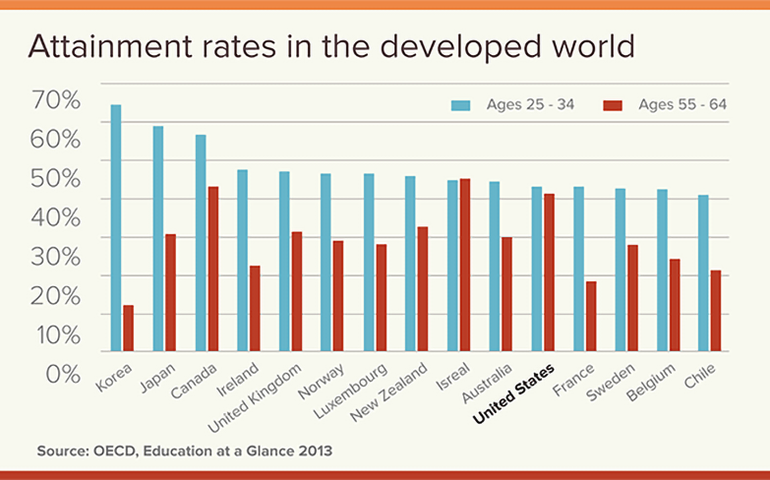UMaine System lands $350K grant from Lumina Foundation
 Courtesy / Lumina Foundation, Organisation for Economic Co-operation and Development
The United States reached a higher education attainment rate of 40% for young adults in the 1970s, but stopped there while other countries pushed beyond. Today, several countries award college-level degrees to more than 50% of their young people.
Courtesy / Lumina Foundation, Organisation for Economic Co-operation and Development
The United States reached a higher education attainment rate of 40% for young adults in the 1970s, but stopped there while other countries pushed beyond. Today, several countries award college-level degrees to more than 50% of their young people.
The University of Maine System has been awarded a $350,000 grant to expand opportunities for adults, and especially people of color, to attain degrees and other learning credentials.
The award came from the Lumina Foundation’s All Learning Counts initiative, which works to make knowledge and abilities gained outside of higher education recognized and applied toward credentials of value, according to a news release. The sources of that learning include work, the military and other experiences.
Indianapolis-based Lumina is the nation’s largest private foundation with a focus on increasing Americans’ success in higher education.
The initiative is designed to help meet the goals of MaineSpark, a coalition of education and business organizations that is working to create a Maine workforce with 60% of adults achieving learning certifications by 2025.
Currently, 46% of Mainers have a post-secondary education, the organization said. When the effort began in 2015, the number was 40%.
“To achieve Maine’s commitment to meeting the MaineSpark goal of 60% of adults attaining a credential of value by 2025, we must expand access to a range of credentials, from micro-credentials through traditional degrees,” Rosa Redonnett, UMS associate vice chancellor for student success and credential attainment, said in the release.
“This generous grant from the Lumina Foundation enables the UMS and its statewide partners to develop an aligned ecosystem across the state and engage with employers in the critical determination of their needs. Together we will work with a broad group of constituents representing key populations in Maine to enhance existing pathways and create new opportunities for credential attainment in Maine.”
‘Micro-credentials’
All Learning Counts/Maine is a coalition of public and private organizations developing a “micro-credential ecosystem” to support adult learners in gaining credentials to meet employer needs.
The partnership comprises 11 of Maine’s education and workforce development organizations, including the University of Maine System’s campuses in Orono and Augusta, the Wabanaki Center, Eastern Maine Community College, the Maine Department of Corrections and its vendor Edovo, Maine Department of Labor and the State Workforce Board, and Maine Department of Education Adult Education programs. Local programs are also included, such as United Technologies Center, Educate Maine and Maine State Library.
UMS was awarded the grant to increase educational attainment of Maine’s workforce, which is expected to fill the jobs.
Maine’s experienced workforce is sometimes held back from growth opportunities due to a lack of formal credentials. A critical component of improving educational attainment of the workforce is validation of non-institutional learning toward earning credentials.
“Through All Learning Counts, we are recognizing exemplars who want to ensure many more Americans will have skills they need to thrive by earning college degrees, certificates, and industry certifications,” Haley Glover, the Lumina strategy director who will oversee the grant program, said in the release.
“We need to think in new ways about the recognition of learning after high school. We must see that all college-level learning, regardless of how and where it is gained, can be applied toward meaningful post-high school credentials.”
UMS was one of nine institutions nationwide that received the grants, from a pool of 78 applicants.
Maine lags
By 2025, 60% of Americans will need some type of high-quality credential beyond high school, according to the foundation.
Maine is making progress in increasing educational attainment, but still lags when compared to the national average.
To reach state goals, the state will not only have to maintain current rates of attainment but also significantly increase the number of people who enroll in programs and earn all types of credentials beyond high school. With the inclusion of workforce certificates beginning in 2014, Maine's overall rate of educational attainment has increased by 9.2% since 2008.
The foundation says every state has significant gaps in educational attainment — often, gaps linked to race and ethnicity. Because educational attainment beyond high school has become the key determinant of economic opportunity and social mobility, closing these gaps is crucial.
Between now and 2025, assuming current rates of degree and certificate production continue, about 24.2 million U.S. residents will earn post-secondary credentials. To reach the goal, 16.4 million more need to be added to that total.














0 Comments